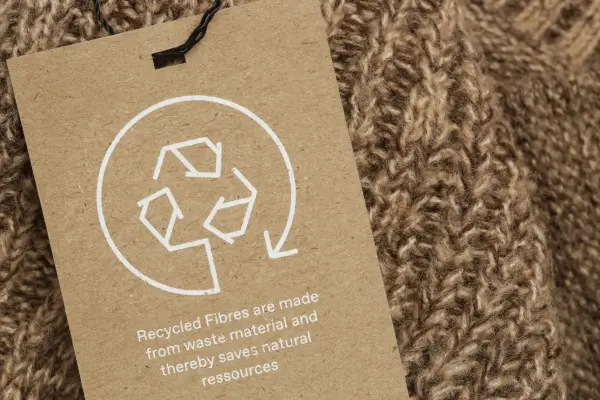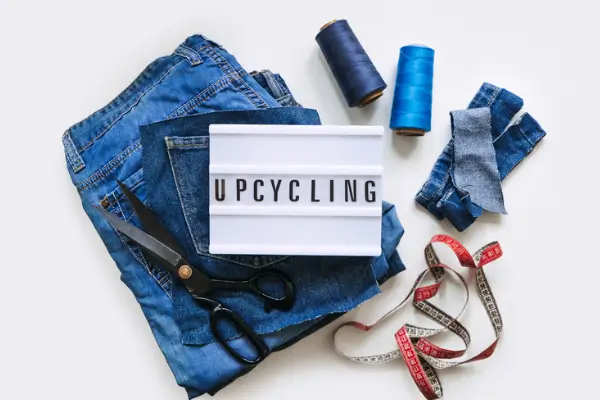The rise of recycled clothing
The fashion industry has long been known for its significant environmental impact, contributing to pollution, waste, and resource depletion. Did you know that the global textile industry produces over 92 million tons of waste each year? This staggering statistic highlights the urgent need for sustainable solutions. One such solution gaining traction is recycled clothing.
Recycled clothing involves transforming waste materials, such as discarded fabrics and old garments, into new, fashionable items. This process not only helps reduce the environmental footprint of the fashion industry but also promotes a circular economy, where products are reused and recycled rather than discarded.
In this article, we will explore the various benefits of recycled clothing, from its environmental advantages to its economic, social, and ethical impacts. We’ll also provide practical tips for incorporating these sustainable pieces into your wardrobe. By understanding how recycled clothing can transform waste into fashion, you can make more informed, eco-friendly choices in your daily life.
Understanding recycled clothing
What is recycled clothing?
Recycled clothing refers to garments made from previously used materials. This can include anything from post-consumer waste, like old clothes and textiles, to pre-consumer waste, such as fabric scraps left over from the manufacturing process. The key idea is to repurpose these materials into new, wearable items, thereby reducing waste and conserving resources.
The recycling process
The journey of recycled clothing starts with the collection of old garments and textiles. These materials are then sorted by type, color, and fabric. After sorting, the textiles are cleaned to remove any dirt or contaminants. The next step involves breaking down the materials into fibers, which can be spun into new yarn. This yarn is then woven or knitted into new fabrics, ready to be turned into fresh, fashionable clothing. Some recycled clothing is also made by upcycling, where old garments are redesigned and altered to create new styles without fully breaking down the original materials.
Why recycled clothing matters
The significance of recycled clothing lies in its contribution to environmental sustainability. The fashion industry is one of the largest polluters in the world, and traditional clothing production consumes vast amounts of water, energy, and raw materials. By opting for recycled clothing, we can help mitigate these impacts. Recycling textiles reduces the need for virgin materials, saving natural resources and decreasing pollution. Moreover, it helps divert waste from landfills, where textiles can take decades to decompose. Embracing recycled clothing is a step towards a more sustainable and eco-friendly fashion industry, promoting a circular economy where products are continually reused and repurposed.
Environmental benefits
Switching to recycled clothing offers numerous environmental benefits. Let’s delve into the key ways this sustainable choice helps the planet.
Waste reduction
One of the most significant advantages of recycled clothing is its ability to reduce textile waste. Each year, millions of tons of clothing end up in landfills, where they can take decades to decompose. By recycling textiles, we can divert a substantial amount of waste from these landfills. For example, turning old jeans into new denim products or repurposing used fabrics into stylish accessories helps decrease the volume of discarded materials, contributing to a cleaner environment.
Resource conservation
Recycled clothing plays a crucial role in conserving valuable natural resources. Traditional clothing production requires significant amounts of water, energy, and raw materials. For instance, producing a single cotton t-shirt can consume up to 2,700 liters of water. By contrast, recycled clothing uses existing materials, drastically reducing the need for new resources. This conservation effort not only saves water and energy but also diminishes the demand for raw materials like cotton and synthetic fibers, which often involve intensive farming and chemical processes.
Pollution reduction
The process of recycling clothing also contributes to reducing pollution. Manufacturing new textiles typically involves chemical treatments and dyeing processes that release harmful pollutants into the environment. Recycled clothing, however, minimizes the need for these polluting processes. By reusing existing materials, the recycling process cuts down on the use of dyes, chemicals, and water, leading to fewer pollutants entering our air, water, and soil. This reduction in pollution helps preserve ecosystems and promotes a healthier planet.
Choosing recycled clothing is a powerful way to make a positive environmental impact. By reducing waste, conserving resources, and minimizing pollution, recycled clothing supports a more sustainable and eco-friendly fashion industry.
Economic benefits
Cost savings for consumers
One of the immediate economic benefits of recycled clothing is cost savings for consumers. Recycled garments often come at a lower price point compared to new, traditionally manufactured clothes. This is because the materials used in recycled clothing are repurposed from existing textiles, which can be more cost-effective than sourcing new raw materials. By opting for recycled clothing, consumers can enjoy stylish, high-quality fashion at a fraction of the cost, making sustainable choices more accessible.
Job creation
The recycled clothing industry also contributes to job creation. The process of collecting, sorting, and recycling textiles requires a workforce, providing employment opportunities at various stages of the recycling process. From collection centers and recycling facilities to design and retail, this industry supports numerous jobs. Moreover, as the demand for sustainable fashion grows, so does the potential for new business ventures and innovations in the recycling sector, further boosting job creation and economic growth.
Support for sustainable brands
Purchasing recycled clothing supports businesses committed to sustainability and ethical practices. Many brands that produce recycled clothing prioritize transparency, fair labor practices, and environmentally friendly manufacturing processes. By choosing to buy from these brands, consumers help drive demand for more sustainable business models. This support encourages other companies to adopt similar practices, fostering a market that values environmental responsibility and ethical production.
Embracing recycled clothing is not only a step towards a greener planet but also a smart economic decision. Consumers benefit from cost savings, while the industry creates jobs and promotes sustainable business practices. This combination of financial and ethical advantages makes recycled clothing an appealing choice for those looking to make a positive impact.
Fashion and style benefits
Unique and custom designs
One of the most exciting aspects of recycled clothing is the unique and custom designs it offers. Because recycled clothing often involves repurposing existing materials, each piece can be one-of-a-kind. Designers frequently use creative techniques to transform old garments into new fashion statements, resulting in items that stand out from mass-produced clothing. This uniqueness allows individuals to express their personal style in a way that is both fashionable and eco-friendly.
Quality and durability
Recycled clothing can also offer superior quality and durability. Many recycled garments are crafted with attention to detail and high-quality materials, ensuring they last longer than fast fashion items. By using sturdy, repurposed fabrics and emphasizing craftsmanship, recycled clothing brands often produce pieces that withstand wear and tear better. This focus on durability means that consumers can enjoy their favorite pieces for years, reducing the need for frequent replacements and contributing to a more sustainable wardrobe.
Fashion trends
Recycled clothing is increasingly aligning with current fashion trends, making it easier for consumers to stay stylish while making sustainable choices. As the demand for eco-friendly fashion grows, more designers and brands are incorporating recycled materials into their collections. From chic streetwear to elegant evening wear, recycled clothing is available in a wide range of styles and looks that cater to modern fashion sensibilities. This trend not only makes sustainable fashion more accessible but also helps shift the industry towards more environmentally responsible practices.
Embracing recycled clothing allows you to enjoy unique designs, superior quality, and trend-aligned styles. By choosing recycled fashion, you can express your individuality, invest in durable pieces, and stay on-trend while supporting sustainable practices.
Social and ethical benefits
Fair labor practices
Recycled clothing often supports fair labor practices, which is a significant social and ethical benefit. Many brands committed to sustainability also prioritize ethical manufacturing processes. This means ensuring safe working conditions, fair wages, and reasonable hours for workers involved in the production of recycled garments. By choosing recycled clothing, consumers can feel confident that their purchases are supporting companies that value and uphold human rights.
Community impact
The production and sale of recycled clothing can have a positive impact on local communities. Recycling programs and sustainable fashion brands often engage in community-based initiatives, such as local collection drives and educational campaigns about sustainable living. These activities not only create jobs but also foster a sense of community involvement and responsibility. Supporting these initiatives helps strengthen local economies and encourages more widespread adoption of eco-friendly practices.
Ethical consumption
Choosing recycled clothing is a powerful way to promote ethical consumption. It reflects a commitment to reducing waste and making more mindful purchasing decisions. Ethical consumption involves considering the broader impact of what we buy, including how products are made and who is affected by their production. By opting for recycled clothing, consumers take a stand against the environmental and social issues associated with fast fashion, such as pollution, resource depletion, and labor exploitation. This shift towards ethical consumption encourages a more sustainable and just fashion industry.
Recycled clothing not only benefits the environment but also supports fair labor practices, community initiatives, and ethical consumption. By choosing these garments, consumers can make a positive social and ethical impact, contributing to a more equitable and sustainable world.
Practical tips for incorporating recycled clothing into your wardrobe
Where to buy
Finding high-quality recycled clothing is easier than ever with the growing number of sustainable brands and retailers. Look for stores and online shops that specialize in eco-friendly fashion, such as Patagonia, Eileen Fisher, and Reformation. Additionally, many thrift stores and vintage shops offer unique recycled pieces. Websites like Poshmark and ThredUp are also excellent resources for finding gently used clothing that can be given a second life.
How to care for recycled clothing
Proper care is essential to maintain the quality and longevity of recycled clothing. Always follow the care instructions on the label to avoid damaging the fabric. Wash clothes in cold water to save energy and reduce wear and tear. Air dry whenever possible, as tumble drying can cause shrinkage and weaken fibers. Using gentle, eco-friendly detergents can also help preserve the fabric and prevent environmental harm.
DIY projects
Creating your own recycled clothing through DIY projects can be a fun and rewarding way to embrace sustainable fashion. Simple alterations, such as adding patches, embroidery, or dyeing old garments, can breathe new life into your wardrobe. You can also try upcycling projects, like turning an old pair of jeans into a stylish tote bag or transforming a worn-out sweater into cozy mittens. These projects not only reduce waste but also allow you to customize your clothing to reflect your personal style.
By following these practical tips, you can seamlessly integrate recycled clothing into your daily life. Finding reputable sources, caring for your garments properly, and engaging in DIY projects can help you build a sustainable and stylish wardrobe that supports environmental and ethical practices.
Embracing a sustainable fashion future
Recycled clothing offers a multitude of benefits, from reducing environmental impact to supporting ethical practices and saving money. By understanding the various types of recycled clothing and their advantages, you can make informed decisions that positively affect both your wardrobe and the planet.
Choosing recycled clothing helps reduce waste, conserve resources, and decrease pollution. It also supports fair labor practices and strengthens local communities. Moreover, recycled clothing allows you to enjoy unique, durable, and trendy pieces without compromising on style.
As you incorporate recycled clothing into your wardrobe, remember to shop from reputable sources, care for your garments properly, and explore creative DIY projects. Each small step you take contributes to a larger movement towards a more sustainable and ethical fashion industry.
So, why not start today? Embrace the benefits of recycled clothing and become part of the solution to the fashion industry’s environmental challenges. By making conscious choices, you can help create a sustainable fashion future for generations to come.




